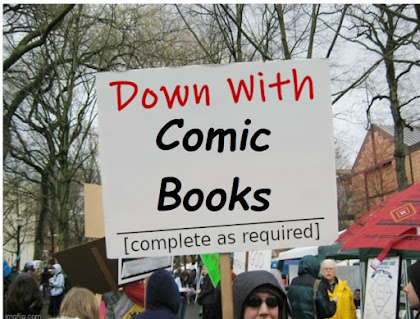Down With... Comic Books
In July of 1972, Gloria Steinem and Dorothy Pitman Hughes co-founded Ms. Magazine, intended as a platform for the then-current Second-wave Feminism movement.
For the cover of their very first issue, Gloria Steinem chose, as the public face of the modern feminist movement, the character of Wonder Woman.
As journalist Joanne Edgar wrote in that issue,
"Breaking the fetters of evil with her strength; parrying bullets with her steel bracelets; sweeping through dimensions of time and space in her invisible plane, Wonder Woman, the Amazonian princess from Paradise Isle, brought enemies to their knees and to her command with her golden magic lasso." Who could resist a role model like that? In America she lived as Diana Prince — secretary, nurse, army intelligence officer — but she could change into Wonder Woman costume and appear from nowhere to do battle with the forces of evil.
Later in her article, she discusses the original creator of Wonder Woman:
Wonder Woman herself first appeared in 1941, the invention of a psychologist named William Moulton Marston. Attorney, inventor of the lie-detector test, prison reformer, and businessman, Marston (who wrote comics under the thinly disguised pen name of Charles Moulton) conceived of Wonder Woman as a counter to the "bloodcurdling masculinity" of most comic books. Both plot and characters were based on Marston's self-styled vision of feminist philosophy. "Women represent love; men represent force," he wrote. "Man's use of force without love brings evil and unhappiness. But Wonder Woman has force bound by love and, with her strength, represents what every woman should be and really is. She corrects evil and brings happiness. Wonder Woman proves that women are superior to men because they have love in addition to force."
It should be noted that not everyone was as positive about Wonder Woman as Joanne Edgar and Gloria Steinem were. in 1954, a different psychologist, Dr. Fredric Wertham, had published Seduction of the Innocent; a lengthy treatise about the evils of the comic book industry.
Although his book was filled with contempt for comic books in the abstract, he reserved specific outrage for the character of Wonder Woman.
As to the “advanced femininity,” what are the activities in
comic books which women “indulge in on an equal footing with
men”? [...] They are not homemakers. They do
not bring up a family. Mother-love is entirely absent. Even
when Wonder Woman adopts a girl there are Lesbian overtones.
They are either superwomen flying through the air, scantily
dressed or uniformed, outsmarting hostile natives, animals or
wicked men, functioning like Wonder Woman in a fascistic-
futurist setting, or they are molls or prizes to be pushed around
and sadistically abused. In no other literature for children has
the image of womanhood been so degraded.
He goes on to say,
The Lesbian counterpart of Batman may be found in the
stories of Wonder Woman and Black Cat. The homosexual con-
notation of the Wonder Woman type of story is psychologically
unmistakable. The Psychiatric Quarterly deplored in an edi-
torial the “appearance of an eminent child therapist as the im-
plied endorser of a series . . . which portrays extremely sadistic
hatred of all males in a framework which is plainly Lesbian.”
For boys, Wonder Woman is a frightening image. For girls
she is a morbid ideal. Where Batman is anti-feminine, the at-
tractive Wonder Woman and her counterparts are definitely
anti-masculine.
To the puritanical Dr. Wertham, Wonder Woman was dangerous (and apparently lesbian) because she taught little girls that women could be something other than homemakers and mothers.
A generation later, those impressionable little girls had grown up to be second-wave feminists like Gloria Steinem and Dorothy Pitman Hughes, so I guess Dr. Wertham was absolutely correct about that (fortunately).
This week's film dramatizes the life of William Moulton Marston, the psychologist whose comic book character was to make such an indelible impression on so many people (over so many generations).
Fredric Wertham may have been horrified by the "lesbian" implications of Professor Marston's creation, but he really shouldn't have concerned himself with that sort of thing. The "real" story (should Dr. Wertham ever have discovered it) was so much worse (or so it would have seemed to him).
Professor Marston and the Wonder Women was written and directed by Angela Robinson, a young film-maker at the beginning of what will hopefully prove to be a long and successful career. She approaches the project with a great deal of respect and nuance; carefully avoiding the more obvious potential pitfalls of such a story.
Dr. Wertham and his followers may have been horrified because comic book characters such as Wonder Woman presented readers with alternatives to the very rigidly-defined gender roles of the mid-Twentieth Century.
The popularity and success of these characters showed that, if anything, the public was starving for this sort of representation.
Wonder Woman was only a threat if you happen to be terrified of what she stood for.
Gloria Steinem understood that.
So does Angela Robinson.
We will be screening Professor Marston and the Wonder Women at 7.30 on Thursday, the 23rd of March, at the Victoria Park Baptist Church.











Comments
Post a Comment